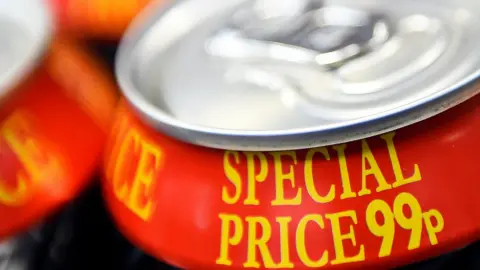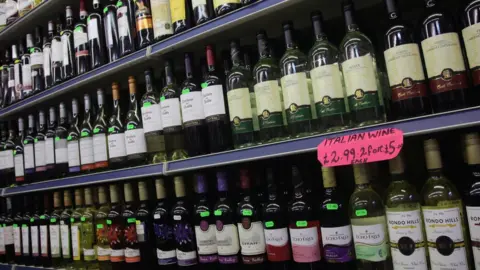Alcohol: Wales minimum pricing law comes into force
 Getty Images
Getty ImagesA new law introducing a minimum alcohol price in Wales has come into force.
As of Monday, retailers and any outlets serving alcohol must charge at least 50p a unit, meaning a typical bottle of wine costs no less than £4.69.
Health Minister Vaughan Gething said it would tackle "harmful and damaging" drinking of cheap, strong alcohol.
A report found alcohol sales in Scotland dropped after a similar system started there in May 2018, while sales rose slightly in Wales and England.
The Public Health Minimum Price for Alcohol Wales Act 2018 forces retailers to use a formula for working out minimum pricing.

Mr Gething said there had been "lots of debate" when the change was first announced, with some "deeply sceptical and unhappy" about price rises, but the evidence of the health benefits was "so clear".
"It's not about making alcohol unaffordable, it is addressing the most harmful and damaging alcohol - high-strength, cheap alcohol. We have already seen the impact it will have," he said.
"And I really do think, in a few years' time, people in Wales will wonder why there was ever a fuss about doing this."
The Welsh Government said most people would not notice a change in the price of most alcoholic drinks, but "high-strength, low-cost" products, such as white cider, would be significantly more expensive.
Prof Sir Ian Gilmore, chair of the Alcohol Health Alliance, said he was "delighted" by Wales' change and said England risked being "left behind" in the race to tackle alcohol harm.
Mr Gething added: "If we also see a change in behaviour and a real health gain being made that reduces alcohol-related admissions that helps to avoid alcohol-related deaths as well, then I think we will see a change being made across England and... Northern Ireland too."
The Home Office said there were currently no plans to introduce minimum pricing for alcohol in England.
The change was delayed because of objections from Portugal.

What is a unit of alcohol?
 Getty Images
Getty Images- A unit is 10ml of pure alcohol.
- This is equivalent to about half a pint of lower or standard-strength beer or cider.
- A single 25ml shot of sprits is about one unit.
- A small 125ml glass of wine contains about 1.5 units.
Source: NHS Direct Wales

Official figures show about 500 people die in Wales each year from alcohol-related causes, with 60,000 hospital admissions related to alcohol consumption, adding up to an estimated £159m cost to the Welsh NHS each year.
Dr Sarah Aitken, director of public health for Aneurin Bevan University Health Board, said the organisation had been supportive of the law change since it was first mooted.
"We see the effects of excessive alcohol consumption on people's health every day," she said.
"Aside from damaging the liver, alcohol affects the heart, kidneys and brain. It impacts on hospital services, and on people's lives more generally.
"The intervention of minimum pricing will reduce the harm done by alcohol, it's an important step and will hopefully make people think about their relationship with alcohol."
While there has been widespread support for a floor on alcohol pricing in Wales, some concerns have been raised.

'It wouldn't have helped me'

Sarah Pritchard, of Newport, is a recovering alcoholic who, due to cirrhosis of the liver, needs a transplant after being sober for a year.
She said drinking is "just not worth it," and added, "People with addiction, if the prices are going up, to get that drink, I think that there's going to be a lot of crime - robberies, pick-pocketing.
"But, in another respect, it's a good thing because it is there to entice people to get off the drink."
She said alcoholism was a "really scary thing to go through", adding: "I used to get up in the morning to have a drink. I would shake [with] anxiety, I'd be sweating. And that first glass... I couldn't control it because I'd be shaking that much."
Asked whether minimum alcohol pricing would have stopped her from drinking, Ms Pritchard said: "No, because I know what the withdrawal feelings are."

Addiction charity, Kaleidoscope, has suggested the law change will not tackle drinking "middle-class" drinking. People in affluent areas are more likely to consume above the recommended amount, compared to those in the most deprived areas, according to Public Health Wales figures.
However, Dr Aitken said alcohol consumption had less impact on people living in more affluent areas because "the rest of their lifestyles are healthier".
There have also been suggestions the law change will disproportionately affect low-income drinkers, may turn some harmful drinkers to drugs and may increase the risks of brewing alcohol at home.
But the Welsh Government has said research shows most negative outcomes are unlikely.
The health minister said: "The beneficial impact of public health is not just a gain for individual drinkers, it's for all of us."
Mr Gething said he looked forward to the debate continuing, with the Welsh Assembly looking at the law again in five years, informed by the evidence generated in the meantime.
